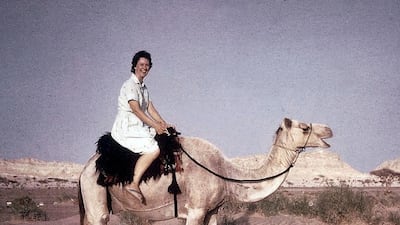The National, in collaboration with NAJAH 2016, ran a student book review competition for students above the age of 16. Below is the winning submission by Gana Al Shafaei.
The Oasis
Gertrude Dyck
Motivate Publishing (2000)
Dh105
In the forward of her book, the author, Gertrude Dyck, also known as Doctora Latifa, writes a personal account of her visit and stay for in Al Ain for more than 40 years, describing the welcoming citizens of Abu Dhabi. Training to be an active nurse, Dr Latifa volunteered to nurse in the Middle East. She describes her experience working in the Oasis Hospital, founded in 1960, drawing a detailed picture of the Bedouin’s life, customs, heritage and language, Arabic, in the desert, while also witnessing the start of the development of the UAE due to the first discovery of oil.
Feeling “privileged”, the writer describes her fascination with the pride, bravery, kindness, innovation, wisdom, determination to improve the country, originality, tradition and customs, such as weddings, camel raising, the souk, sword fighting, ayaala (dancing), areesh houses, and many more, expressed through real images, meaningful word choices, appeals to emotion, accurate historic details and dates, references, and figures of speech. She witnesses the dramatic change in medical provision in Al Ain, through the opening of the Oasis Hospital and improvements in other hospital quarters.
The author describes the UAE's beginning of the new era – oil wealth – along with reciting several incidents of her stay in Al Ain. Believing that getting to know the culture and heritage of a destination is essential when travelling, Dr Latifa/Gertrude Dyck, referred to Arabian Sands by Wilfred Thesiger, as her guide to the customs and traditions of the UAE. When arriving at Al Ain, the author is "surprised", that the depictions in Thesiger's book are not at all what she is witnessing. She sees mud-block buildings and newly built houses at the new hospital district.
A great obstacle, yet a source of fascination to the author, Arabic is the language that most locals believed was the only one in the world. Along with nursing, the narrator studied [Arabic] for a long time including, four months in 1963 and ten months from 1964 to 1965. Retelling one incident, the author describes how, after building the new quarters in the hospital of palm branches and dried leaves, women were not allowed to cook inside though one woman does. All the author hears then is a woman screaming, “Dow, Dow!” Upon looking, the writer sees a fire and screams, “Hariiga!” A word she had learned means, “Fire!”
With all the improvements that Sheikh Zayed worked on that changed people’s lives: “from camel to Cadillacs, from shifting desert trails to six-lane highways, from little areesh huts to huge modern villas”, she still finds the citizens welcoming, caring, undeterred and moral. The author explains how her stay in Al Ain was very happy, how she loved the “beautiful language”, how she felt like she was a “part of big family”. Upon meeting Sheikha Salama bint Butti Al Qubaisi [the mother of Sheikh Zayed and Sheikh Shakhbut], tenderly known as Umm esh Shyuukh or the Mother of Rulers, Dr Latifa becomes extremely fond of her wisdom and kindness, for which she was known.
After those 40 years in UAE, Dr Latifa’s lifestyle is greatly influenced by Arab civilization and ethnicities. In conclusion, Gertrude Dyck, through her narration seizes the opportunity to describe her stay in Al Ain, immortalising her most remarkable life in the UAE on paper. She describes the impact the Arabic language has left on her, along with the kindness, wisdom and friendliness. Those 40 years remained forever printed in her heart – and book. She represents the idea of an accomplished women in many ways.
Review by Gana Al Shafaei. The original has been edited for style and clarity.

